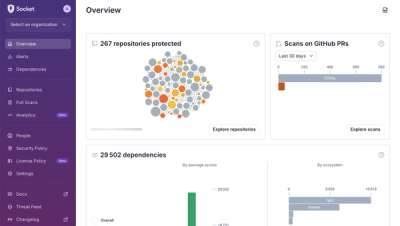
Research
wget to Wipeout: Malicious Go Modules Fetch Destructive Payload
Socket's research uncovers three dangerous Go modules that contain obfuscated disk-wiping malware, threatening complete data loss.
redis-tag-cache
Advanced tools
redis-tag-cacheCache and invalidate records in Redis with tags.
yarn add redis-tag-cache
# or
npm install redis-tag-cache
import TagCache from 'redis-tag-cache';
const cache = new TagCache({
defaultTimeout: 86400 // Expire records after a day (even if they weren't invalidated)
});
/*
* Cache some records tagged with IDs
*/
// Store two posts by the same author
await cache.set(
'post:id-123',
{ id: 'id-123', title: 'Hello world', author: 'user-123' },
['id-123', 'user-123']
);
await cache.set(
'post:id-234',
{ id: 'id-234', title: 'Hello world again', author: 'user-123' },
['id-234', 'user-123']
);
// And a third post by a different author
// and set a custom timeout for it
await cache.set(
'post:id-345',
{ id: 'id-345', title: 'Hello world again', author: 'user-234' },
['id-345', 'user-234'],
{ timeout: 604800 /* Cache for a week */ }
);
/*
* Retrieve records by their ID
*/
console.log(await cache.get('post:id-234')) // => { id: 'id-234', title: 'Hello world again', author: 'user-123' }
/*
* Invalidate records by their tags
*/
// Invalidate all records tagged with `user-123`
await cache.invalidate('user-123');
console.log(await cache.get('post:id-123')) // => null
console.log(await cache.get('post:id-234')) // => null
// The third post not tagged with `user-123` is still around!
console.log(await cache.get('post:id-345')) // => { id: 'id-345', title: 'Hello world again', author: 'user-234' }
const cache = new TagCache(options);
optionsOptions can be an object containing any of the following keys:
defaultTimeout: number of seconds until records expire even if not invalidatedredis: any ioredis option, this object is directly passed through to new Redis(ioredisOptions)Example:
const cache = new TagCache({
defaultTimeout: 86400,
redis: {
keyPrefix: 'my-cache', // Recommended: set a keyprefix for all keys stored via the cache
port: 6379,
host: 'redis-service.com',
password: 'password',
}
});
Store a record in Redis. Usage:
cache.set(key: string, value: any, tags: Array<string>, options?: Object): Promise<void>
optionsCan have one of the following keys:
timeout: number of seconds until the record times out, overrides defaultTimeout optioncache.set('some-key', 'some-value', ['some-tag'], { timeout: 123, })cache
.then(() => console.log('Stored successfully!'))
Get records from the cache. Usage:
cache.get(...keys: Array<string>): Promise<Array<?value> | ?value>
cache.get('existing-key')
.then(data => console.log('Got record!', data));
cache.get('not-existing-key')
.then(data => console.log('data is null', data === null));
cache.get('key-1', 'key-2')
.then(data => console.log('got multiple keys', data[0], data[1]));
Invalidate a set of tags and any records associated with them. Usage:
cache.invalidate(tag1: string, tag2: string, ...): Promise<void>
cache.invalidate('some-tag', 'some-other-tag')
.then(() => console.log('Tags invalidated successfully!'))
Under the hood we store one set for each tag with all its associated keys and your data as a separate record. For example:
cache.set('some-key', 'some-value', ['some-tag']);
cache.set('some-other-key', 'some-other-value', ['some-tag', 'some-other-tag'];
With these two .set calls you'd end up with these records stored in Redis:
data:some-key = "some-value"data:some-other-key = "some-other-value"tags:some-tag = ["some-key", "some-other-key"]tags:some-other-tag = ["some-other-key"]The tradeoff chosen is to keep .get as fast as possible (it's a single redis.get(key), so it couldn't be faster), while making .set a bit slower (since we have to do multiple redis.sets, one for each tags) and .invalidate slow. (since we have to do a redis.get per tag and then a redis.del per record in the tags lists)
PRs implementing this differently under the hood to make .set and/or .invalidate quicker while keeping .get as fast as it is would be appreciated!
Licensed under the MIT License, Copyright ©️ 2018 Maximilian Stoiber. See LICENSE.md for more information.
FAQs
Cache and invalidate records in Redis with tags.
We found that redis-tag-cache demonstrated a not healthy version release cadence and project activity because the last version was released a year ago. It has 1 open source maintainer collaborating on the project.
Did you know?

Socket for GitHub automatically highlights issues in each pull request and monitors the health of all your open source dependencies. Discover the contents of your packages and block harmful activity before you install or update your dependencies.

Research
Socket's research uncovers three dangerous Go modules that contain obfuscated disk-wiping malware, threatening complete data loss.

Research
Socket uncovers malicious packages on PyPI using Gmail's SMTP protocol for command and control (C2) to exfiltrate data and execute commands.

Product
We redesigned Socket's first logged-in page to display rich and insightful visualizations about your repositories protected against supply chain threats.